My Last Vacation (Part One) Posted by sasha on Sep 13, 2012 in Culture, Uncategorized, Vocabulary
Recently I covered some useful vocabulary and phrases for planning a vacation. Well, today I’m going to tell you about my last vacation… in Chinese. For those of you more advanced folks, or those who are really focusing on practicing your reading of Chinese characters, the first part is for you. It is the first half of my vacation story simply in large characters. If you need pinyin, go ahead and scroll down a bit, and then come back up to read the purely Chinese version after you’ve studied a bit! I’ve included some pictures to help out a little. At the very end of the post, you’ll find the English translation. Do your best to only use it when absolutely necessary.
All Chinese Version:
上个假期我们去四川了. 我们从北京飞到成都. 住在一家青年旅社. 那真是个好地方. 那里有餐厅,酒吧, 还能打台球. 每周五,他们还有免费的饺子晚会. 我们先一起包,再一起吃亲手做的饺子.
第二天,我们去人民公园散步. 公园里有很多人在跳舞. 后来我们又去了天府广场. 又从天府广场走到文殊院. 那是川西一座著名的佛教寺院. 当天晚上我们还看了川剧.
第三天, 我们一早起来坐车去大熊猫繁育研究基地. 大熊猫都在吃竹子,看上去很可爱. 我们也看了小熊猫. 晚上我们去吃了四川火锅. 四川火锅特别辣. 饭后我们去逛街. 我们在一家酒吧喝了几瓶黑啤.
第四天晚上我们坐公交车从成都到平了古镇. 我们住在一家宾馆里. 他们的经理有个小宝宝. 我们先去白沫江看一下, 然后去吃饭. 我们点了鱼和排骨,都非常好吃. 吃完饭后,我们去一家卡拉ok唱歌. 我们唱英文歌,还听当地人唱中文歌.
第五天,我们打车去了金华山. 那是个美丽的地方. 我们一边爬山一边拍照. 下午,我们去了李家大院. 那里住的都是农民. 他们种茶叶和玉米. 他们的家很漂亮. 当天晚上我们住在竹海的宾馆. 他们的烧烤非常好吃!我们认识了新的中国朋友. 我们一起喝酒,聊天.
早上我们先吃早餐然后就回成都了. 我们在青年旅社休息,上网,吃饭. 我们早睡早起. 早上我们收拾好我们的东西,打车去了公交站.
With Pinyin:
上个假期我们去四川了. 我们从北京飞到成都. 住在一家青年旅社. 那真是个好地方. 那里有餐厅,酒吧, 还能打台球. 每周五,他们还有免费的饺子晚会. 我们先一起包,再一起吃亲手做的饺子.
shàng gè jià qī wǒ men qù sì chuān le. wǒ men cóng běi jīng fēi dào chéng dū. zhù zài yì jiā qīng nián lǚ shè. nà zhēn shì gè hǎo dì fāng. nà lǐ yǒu cān tīng, jiǔ bā, hái néng dǎ tái qiú. měi zhōu wǔ, tā men hái yǒu miǎn fèi de jiǎo zi wǎn huì. wǒ men xiān yì qǐ bāo, zài yì qǐ chī qīn shǒu zuò de jiǎo zi.
第二天,我们去人民公园散步. 公园里有很多人在跳舞. 后来我们又去了天府广场. 又从天府广场走到文殊院. 那是川西一座著名的佛教寺院. 当天晚上我们还看了川剧.
dì èr tiān, wǒ men qù rén mín gōng yuán sàn bù. gōng yuán lǐ yǒu hěn duō rén zài tiào wǔ. hòu lái wǒ men yòu qù le tiān fǔ guǎng chǎng. yòu cóng tiān fǔ guǎng chǎng zǒu dào wén shū yuàn. nà shì chuān xī yí zuò zhù míng de fó jiào sì yuàn. dàng tiān wǎn shàng wǒ men hái kàn le Chuān jù.
第三天, 我们一早起来坐车去大熊猫繁育研究基地. 大熊猫都在吃竹子,看上去很可爱. 我们也看了小熊猫. 晚上我们去吃了四川火锅. 四川火锅特别辣. 饭后我们去逛街. 我们在一家酒吧喝了几瓶黑啤.
dì sān tiān, wǒ men yì zǎo qǐ lái zuò chē qù dà xióng māo fán yù yán jiū jī dì. dà xióng māo dōu zài chī zhú zi, kàn shàng qù hěn kě’ài. wǒ men yě kàn le xiǎo xióng māo. wǎn shàng wǒ men qù chī le sì chuān huǒ guō. sì chuān huǒ guō tè bié là. fàn hòu wǒ men qù guàng jiē. wǒ men zài yì jiā jiǔ bā hē le jǐ píng hēi pí.
第四天晚上我们坐公交车从成都到平了古镇. 我们住在一家宾馆里. 他们的经理有个小宝宝. 我们先去白沫江看一下, 然后去吃饭. 我们点了鱼和排骨,都非常好吃. 吃完饭后,我们去一家卡拉ok唱歌. 我们唱英文歌,还听当地人唱中文歌.
dì sì tiān wǎn shàng wǒ men zuò gōng jiāo chē cóng chéng dū dào píng le gǔ zhèn. wǒ men zhù zài yì jiā bīn guǎn lǐ. tā men de jīng lǐ yǒu gè xiǎo bǎo bǎo. wǒ men xiān qù bái mò jiāng kàn yí xià, rán hòu qù chī fàn. wǒ men diǎn le yú hé pái gǔ, dōu fēi cháng hǎo chī. chī wán fàn hòu, wǒ men qù yì jiā kǎ lā ok chàng gē. wǒ men chàng yīng wén gē, hái tīng dāng dì rén chàng zhōng wén gē.
第五天,我们打车去了金华山. 那是个美丽的地方. 我们一边爬山一边拍照. 下午,我们去了李家大院. 那里住的都是农民. 他们种茶叶和玉米. 他们的家很漂亮. 当天晚上我们住在竹海的宾馆. 他们的烧烤非常好吃!我们认识了新的中国朋友们. 我们一起喝酒,聊天.
dì wǔ tiān, wǒ men dǎ chē qù le jīn huà shān. nà shì gè měi lì de dì fāng. wǒ men yì biān pá shān yì biān pāi zhào. xià wǔ, wǒ men qù le li jiā dà yuàn. nà lǐ zhù de dōu shì nóng mín. tā men zhǒng chá yè hé yù mǐ. tā men de jiā hěn piào liang. dàng tiān wǎn shàng wǒ men zhù zài zhú hǎi de bīn guǎn. tā men de shāo kǎo fēi cháng hǎo chī! wǒ men rèn shi le xīn de zhōng guó péng yǒu men. wǒ men yì qǐ hē jiǔ, liáo tiān.
早上我们先吃早餐然后就回成都了. 我们在青年旅社休息,上网,吃饭. 我们早睡早起. 早上我们收拾好我们的东西,打车去了公交站.
zǎo shàng wǒ men xiān chī zǎo cān rán hòu jiù huí chéng dū le. wǒ men zài qīng nián lǚ shè xiū xí, shàng wǎng, chī fàn. wǒ men zǎo shuì zǎo qǐ. zǎo shàng wǒ men shōu shí hǎo wǒ men de dōng xi, dǎ chē qù le gōng jiāo zhàn.
English Translation:
We went to Sichuan for our last vacation. We flew from Beijing to Chengdu, and stayed in a youth hostel. It was a really nice place. It had a restaurant, a bar, and you could also play pool. Every Friday, they have a free dumpling party. First we wrapped them together, and then we ate the hand made dumplings together.
On the second day, we went to the People’s Park to walk around. There were many people dancing in the park. Then we went to Tianfu Square. From Tianfu Square, we walked to the Wenshu Monastery. It’s a famous Buddhist monastery in Western Sichuan. In the evening we also saw Sichuan opera.
On the third day we got up early and took a car to the Giant Panda breeding center. The giant pandas were all eating bamboo; they looked really cute! We also saw red pandas. In the evening we ate Sichuan hot pot. Sichuan hot pot is incredibly spicy. After dinner we strolled the streets. We drank a few bottles of dark beer in a bar.
In the evening on the fourth day we took a bus from Chengdu to Pingle Ancient Town. We stayed in a guesthouse. Their manager has a little baby. First we went to the river to have a look, then we went to dinner. We ordered some fish and ribs – they were both delicious! After dinner we went to a karaoke bar. We sang English songs and also listened to locals sing Chinese songs.
On the fifth day, we took a cab to the Golden Flower Mountain. That’s a beautiful place. We hiked and took photos. In the afternoon, we went to the Li Family Courtyard. The people who live there are all farmers. They grow tea and corn. Their home is very beautiful. That evening, we stayed in a guesthouse in the Bamboo Sea. Their BBQ was so delicious! We met some new Chinese friends. We drank together and chatted.
The next day, we just went back to Chengdu. We stayed at the hostel to rest, surf the internet, and eat. We went to bed early and got up early. In the morning we packed our things and got a cab to go to the bus station.

Build vocabulary, practice pronunciation, and more with Transparent Language Online. Available anytime, anywhere, on any device.
About the Author: sasha
Sasha is an English teacher, writer, photographer, and videographer from the great state of Michigan. Upon graduating from Michigan State University, he moved to China and spent 5+ years living, working, studying, and traveling there. He also studied Indonesian Language & Culture in Bali for a year. He and his wife run the travel blog Grateful Gypsies, and they're currently trying the digital nomad lifestyle across Latin America.



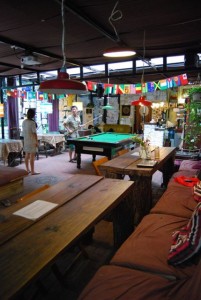
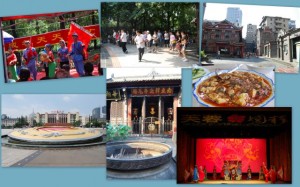
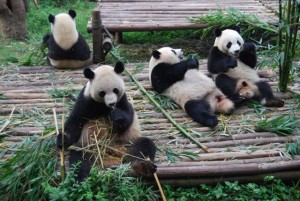
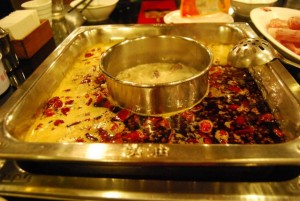
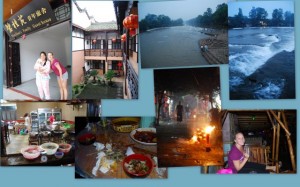
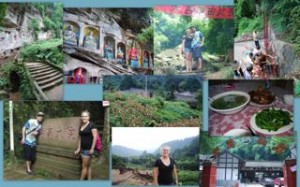

Leave a comment: